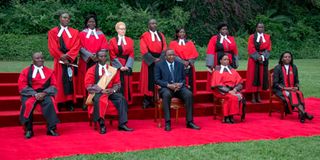Another blow to Uhuru in fight with judges

President Uhuru Kenyatta and Chief Justice Martha Koome (second right)] with Judges of the Court of Appeal at State House, Nairobi during the swearing-in ceremony of recently gazetted Judges. On the right is Chief registrar of the Judiciary, Anne Amadi. PSCU
The High Court has rejected a petition seeking to give the President the powers to nominate and, with the approval of the National Assembly, appoint and dismiss judges of superior courts.
In his ruling, Justice Anthony Mrima faulted the current practice of asking Parliament to approve the appointment of the Chief Justice and Deputy Chief Justice.
He said sending the names of nominees to Parliament would amount to subjecting them to a second round of vetting after they have been vetted and interviewed by the Judicial Service Commission (JSC), the organ mandated to recruit judges and other judicial officers.
“The fact that the Chief Justice and Deputy Chief Justice go through the vetting by the JSC and another round of vetting and approval by the National Assembly is a constitutional aberration, which should not lead to a justification for vetting of other Judges of the Superior Courts by the National Assembly,” said Justice Mrima.
He said such a process “is an assault on the doctrine of separation of powers, judicial independence, and fails to appreciate the role of the JSC in the process”.
Under the Constitution, he added, the President does not have the powers to dismiss judges.
The proposal to have other judges vetted by the National Assembly “can only lead to politicisation of the Judiciary, more so in the context of our fractious politics, and not enhance separation of powers and judicial independence”.
Justice Mrima was ruling on a petition by activist Okiya Omtatah asking the court to rule that sending JSC-recommended judges to the President for approval should not exclude the National Assembly from the process.
Mr Omtatah argued that when the President determines that a judge-nominee has failed the eligibility test, the dispute should be resolved by the National Assembly.
“Even if the JSC will have ensured that it recommends candidates who satisfy eligibility criteria, the President also has an obligation to assure himself or herself that the candidates fulfil eligibility criteria,” said Mr Omtatah in the petition.
Citing a provision of the Constitution, Mr Omtatah’s argued that the President should submit to the National Assembly the names of recommended or nominated candidates for judges of superior courts for approval.
Article 132[2] [f] of the Constitution states: “The President shall nominate, and with the approval of the National Assembly appoint and may dismiss the Cabinet Secretaries, the Attorney-General, the Secretary to the Cabinet, Principal Secretaries, High Commissioners, Ambassadors and Diplomatic and Consular Representatives and, any other State or Public Officer whom this Constitution requires the President to appoint or dismiss.”
But Justice Mrima ruled that the drafters of the Constitution did not intend that article to apply to the appointment of judges.
“If it is intended that the appointment of all judges, other than the Chief Justice and the Deputy Chief Justice, is subject to approval of the National Assembly, nothing would have been easier than for the Constitution to say so, under Article 166 [1],” he said.
He noted that unlike other officers who are subject to the approval of the National Assembly, all judges are subjected to rigorous vetting and interviewing by the Judiciary watchdog, JSC.
“The candidates to judgeship, unlike officers in the Executive, apply for their positions. They are vigorously interviewed by the (JSC), which calls for public views on individual candidates in that process,” he said.
“They do not just crawl out of the woodwork. What would be the rationale for a second round of vetting and approval by the National Assembly?”
The petition stemmed from the longstanding dispute involving the appointment of 41 judges. President Uhuru Kenyatta selected 34 and rejected six.
Mr Omtatah wanted the President to submit to the National Assembly the names of the six nominees that he rejected.
“The President has no capacity to condemn the six persons unheard. The appointment is not an event and mere formality; it is a hallowed and obligatory process, involving vetting and approval of prospective appointees by the National Assembly,” he said.
“The President has failed to act within a reasonable time, in the performance of a critical constitutional function.”





